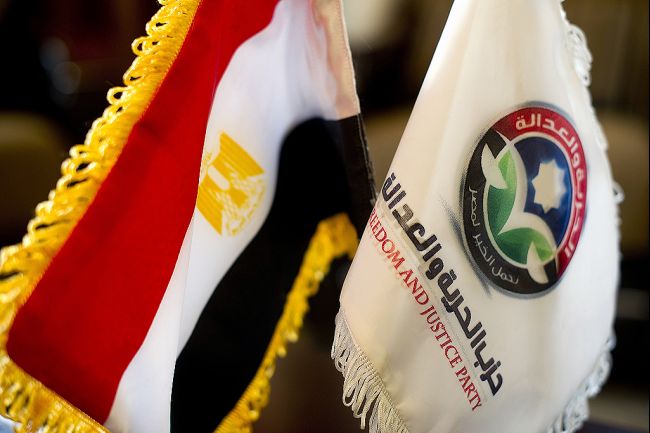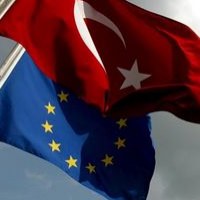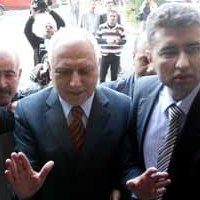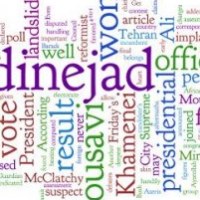![]()
By Crethi Plethi

An Egyptian flag is placed next to the flag of the Freedom and Justice Party at the party headquarters in Cairo on November 30, 2011. The FJP is a front for the Muslim Brotherhood. (ODD ANDERSEN/AFP/Getty Images)
The Muslim Brotherhood, who oversaw Egypt’s ‘facebook’ revolution that began on 25 January 2011, is now leading Egypt — gradually — towards an Islamist Republic. What many feared — but was denied in the West — became reality after all with the approval of the final draft of the constitution by the Islamist-dominated Constituent Assembly.
Last thursday, 22 November 2012, Egyptian president Muhammad Mursi, the first Islamist head of state in Egypt, already issued a constitutional declaration, which opposition groups say grants him unprecedented powers and makes him a new dictator. The declaration set off countrywide protests and plunged Egypt into crisis.
Today, demonstrators poured into Tahrir square to join a sit-in started by hundreds of demonstrators after Morsy issued the declaration on thursday.
An open letter — signed by 22 Egyptian rights groups — posted on the Cairo Institute for Human Rights website stated,
“The president, who now possesses authorities beyond those enjoyed by any president or monarch in Egypt’s modern history, has dealt a lethal blow to the Egyptian judiciary, thereby declaring the beginning of a new dictatorship in which it is not permitted to oppose the president, criticize his policies, or challenge his decisions.”
On Thursday afternoon, the Islamist dominated Constituent Assembly began voting on each of the 236 articles of the draft constitution and as was expected the assembly agreed to all articles. The assembly, for example, unanimously approved Article 2, which states that the principles of Sharia are the primary source of legislation. The use of language in some articles is overly broad and open to interpretation which causes concern over the possibility to justify wide-ranging limitations on human rights.
The final constitutional draft was finished early friday morning and needs to be ratified in a constitutional referendum to go into effect. In a first response, Human Rights Watch slammed the final draft of the constitution, saying it undermines the protection of rights, freedom of religion, freedom of expression, military trials of civilians, minority rights and women’s rights.
One should also remember that Muhammad Mursi was a member of an anti-Israel group — the Committee to Resist Zionism — and participated for the first time in a parliamentary election (fielded by the Muslim Brotherhood) in 2000. Mursi’s decision to seize more power for himself through a decree is not only a bad omen for democracy, freedom and security in Egypt and the Middle East, it is also the Brothers long-awaited dream to take over Egypt and turn it into an Islamist state.
Mursi — after winning Egypt’s presidential runoff on 24 June 2012 — issued an amnesty decree for imprisoned jihadists. Remember, these decrees cannot be judicial challenged anymore. Among them are leaders of terrorist organizations al-Gama’a al-Islamiyya and Egyptian Islamic Jihad. Both terror organizations are connected to Sadat’s assassination. Al-Gama’a al-Islamiyya, an Egyptian Sunni Islamist movement, is also held responsible for the killing of hundreds of policemen and soldiers, civilians, and dozens of tourists in Egypt. The Islamic Jihad has been led by Ayman al-Zawahiri [now leader of al-Qaeda]. And this is only the first of Mursi’s planned release of 12,000 jihadists currently in Egypt’s prisons. That’s how Islamists nowadays use elections and referendums to disguise an authoritarian, Islamist agenda.
So how should we define Mursi’s [or the Brother’s] beliefs and what will this bring Egypt’s society — and the Middle East — in the long-term? If Mursi holds to the Brotherhood’s credo, “Allah is our objective; the Quran is our law, the Prophet is our leader; Jihad is our way; and death for the sake of Allah is the highest of our aspirations” than this “new Islamist state” will be the worst outcome of the 25 January 2011 revolution.
To give you a better picture of what can be expected from Mursi and his Brothers (the Muslim Brotherhood), one just needs to paraphrase Laurence W. Britt’s 14 characteristics of Fascism. Of course, Britt was analysing fascist regimes when he came up with his 14 characteristics of fascism, but the same characteristics can be applied to any totalitarian political and religious system including communism and Islamism. The point is that Islamism has to be seen as such.
Keep in mind that most of these 14 characteristics are actually characterized by the Koran itself and as a consequence have been a part of Islamic dominated societies. Does this prove that Islam is a religion of hate or is it, as some say, a religion of peace? At best, one could argue that it’s neither, rather what’s important is how someone interprets the Koran. And I believe these characteristics pretty much predict how Muhammad Mursi (and his Muslim and Salafi Brothers) interprets the Koran and which path they will follow in establishing an “totalitarian” Islamist state, in someway parallel to the Islamic Republic of Iran.
To speak with Britt’s words,
“And … [Islamism’s] principles are wafting in the air today, surreptitiously masquerading as something else, challenging everything we stand for. The cliché that people and nations learn from history is not only overused, but also overestimated; often we fail to learn from history, or draw the wrong conclusions. Sadly, historical amnesia is the norm.”
So here they are, the 14 characteristics of Revolutionairy Islamism (or Islamofascism if you wish).
![]()
The 14 Characteristics of Revolutionary Islamism
Early Warning Signs of Islamofascism
1. Powerful and continuing expressions of re-establishing the Caliphate, Sharia and Islamic expansionism
2. Disdain for the importance of human rights, women’s rights and minority rights
3. Identification of enemies/scapegoats as a unifying cause: i.e. Israel/Jews, America, the West, Christianity, apostacy…
4. Supremacy of the militancy/avid jihadism
5. Rampant sexism: male-dominated societies viewing women as second-class citizens and adamantly homophobic
6. Controlled mass media: limiting or suppressing freedom of press and freedom of expression
7. Obsessed with preserving the Islamic identity and Muslim unity
8. Religion and ruling elite are intertwined
9. State-supported and clerically-controlled economy: no protection for economic elite
10. Power of labor is consistent with and under direct control of Islamic law and jurisprudence
11. Disdain for (Western) ideologies, intellectuals and the arts: non-Islamic ideas or expressions of dissent are attacked, silenced, or crushed
12. Obsession with crime and punishment as defined in Islamic law
13. Rampant cronyism and corruption: the power elite and clergy enrich themselves as a result of favoritism
14. Fraudulent elections: common methods include intimidation, social pressure and destroying legal votes
Shall we end here with Britt’s own words:
“Does any of this ring alarm bells? Of course not. After all, this is … [the new Egypt], officially a democracy with the rule of law, a constitution, a free press, honest elections, and a well-informed public constantly being put on guard against evils. Historical comparisons like these [totalitarian states] are just exercises in verbal gymnastics. Maybe, maybe not.”
You can download a brief overview here about the history of Islamism from Hasan al-Bana to the Arab Spring.
You can download the English text of the 1971 Constitution of Egypt here.
You can download the English text of the 2012 Constitution of Egypt here.



 RSS
RSS










[…] Mohamed Mursi’s proclamation of a “new republic” on December 26, after the passage of a Constitution that turns Egypt into an Islamist-ruled, pseudo-democratic state, the “January 25th […]